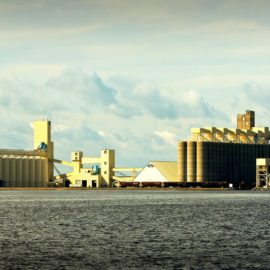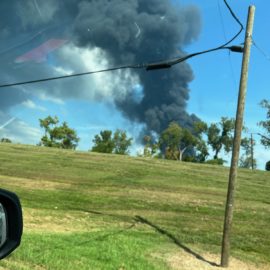
There are all sorts of reasons not to build the gran elevator and they are in court now but a judge said “so what” and let the pre-construction pole driving start.
The developers of a controversial $400 million grain elevator in Wallace will be allowed to conduct pre-construction activities, including pile driving, at the proposed site over the objections of opponents who contend the work may disturb the graves of slaves on the former plantation property. Judge J. Sterling Snowdy of the 40th Judicial District Court in LaPlace on Friday denied a temporary restraining order that the Descendants Project, a St. John the Baptist nonprofit group, had requested to block the work planned by Greenfield Louisiana LLC. Snowdy is overseeing a lawsuit filed by the Descendants Project against St. John the Baptist Parish that challenges a 1990 rezoning of the property for heavy industrial use.
nola.com
Corrupt zoning and health matters led to a application to block the plant but that does not matter.
Sisters Jo and Joy Banner, owners of the Fee-Fo-Lay Cafe in Wallace and leaders of the Descendants Project and the opposition to the silo facility, argued in court filings that “corrupt rezoning” was involved in the land use change. The Banners linked the project to the conviction of former parish president Lester Millet Jr. on charges that included extorting $200,000 from the person who brokered the 1990 sale of the land to Formosa Plastics Corp., which wanted to build a rayon plant on the site. Formosa Plastics abandoned that plan in 1992. In July 2021, Greenfield bought the west bank site for a facility that will include a loading terminal and 54 silos. In April, Snowdy dismissed several challenges by the parish to the Descendants lawsuit. But on June 1, he also allowed Greenfield, which had intervened in the Descendants lawsuit, to appeal his decisions to the state Fifth Circuit Court of Appeal. He did not grant Greenfield’s request to pause action on the suit itself until the appeals court issues a ruling, though. The opponents also argue that grain dust from the new terminal will add to the environmental threat faced by mostly Black and low-income residents in Wallace, which is already plagued by air pollution from nearby chemical plants. “We are disappointed that we weren’t granted the injunction,” said Joy Banner. Though Greenfield was supposed to have consulted specifically with the Descendants group before any construction began, the group only learned of Greenfield’s work after the company sent postcards to some residents warning that pile driving was about to start, she said.
The Corps of Engineers is being asked to stop the project as the historical nature of the area is important to the residents.
“We are disappointed that we weren’t granted the injunction,” said Joy Banner. Though Greenfield was supposed to have consulted specifically with the Descendants group before any construction began, the group only learned of Greenfield’s work after the company sent postcards to some residents warning that pile driving was about to start, she said. Banner also objected to language in motions Greenfield filed in support of their request to do the work, in which Greenfield charged that the Descendants Project had provided no proof of graves being found on the property. “The fact that we don’t have evidence is a result of the system of slavery, where burial grounds were unmarked,” said Pam Spees, an attorney with the Center for Constitutional Rights, which is representing the Descendants group. “And we don’t have access to the site. Greenfield has not allowed us access to the site.” Spees added that the judge’s decision Friday “highlights the painful, outrageous and absurd Catch-22 of history that the descendants find themselves in — doing everything they can to find and protect the graves of their ancestors on these sites, while their ancestors are still in the possession and control of private landowners who can decide their fate.”
The companies lawyers are happy with the judges decision and glad they can begin the building process.
But Louis Buatt, an attorney representing Greenfield, praised Snowdy’s decision. “The court’s decision is a win for the people of the parish who will benefit from the jobs, opportunity, engagement and revenue that Greenfield will bring to the community,” he said. “This was just another procedural attempt by a vocal few to hold up a project that is anticipated to have immense benefit to the community.”
Jobs and pollution over ride health and the environment. This is Louisiana.



